This article was co-authored by Natalia S. David, PsyD. Dr. David is an Assistant Professor in Psychology at the University of Texas Southwestern Medical Center and a Psychiatry Consultant at Clements University Hospital and at Zale Lipshy University Hospital. She is a member of the Board of Behavioral Sleep Medicine, the Academy for Integrative Pain Management, and the American Psychological Association’s Division of Health Psychology. In 2017, she received the Baylor Scott & White Research Institute’s Podium Presentation Award and scholarship. She received her PsyD from Alliant International University in 2017 with an emphasis in Health Psychology.
There are 20 references cited in this article, which can be found at the bottom of the page.
This article has been viewed 39,400 times.
If your anxiety makes you feel stupid or embarrassed frequently, you’re not alone. It’s common to feel awkward when you have social anxiety--many people do. However, these feelings aren’t always rational or realistic, chances are, other people may not think you’re stupid at all. With some practice, you can get rid of your negative self-image[1] and stop feeling embarrassed around others.[2] The first steps are to overcome your self-critical thoughts and build healthy, anxiety-fighting habits. After that, you can work on your social skills to build your confidence around other people.
Steps
Overcoming Negative Thinking
-
1Get some perspective. Anxiety can distort your perspective, making you feel like one mistake is the end of the world. However, this is almost never true. People are rarely as critical of you as you are of yourself, and they probably don’t even notice your mistakes as much as you do.[3]
- Even if you make an obvious social mistake, people probably don’t hold it against you. In fact, they may sympathize – everyone knows what it’s like to feel awkward or not know what to say.
- You can get perspective by reading websites or blogs about people who are in your shoes. See how they managed tough situations.
-
2Avoid expecting perfection of yourself. No one is perfect. Even confident, outgoing people say or do awkward things in social situations sometimes. Making a mistake doesn’t mean you’ve failed. Rather, it means you’re facing your fears and improving your social skills.[4]
- Reduce perfectionism by practicing making mistakes. Intentionally, make a grammatical error on a social media post or informal email. Leave your home slightly messy for a few days. Notice that the world doesn't end and people don't think any less of you for making these minor mistakes.[5]
Advertisement -
3Understand your limits. Treating anxiety works best when you work on matters a little bit at a time. Take time to inventory what triggers your anxiety, and start working on those issues, first. Build up gradually rather than trying to overcome too many obstacles at once, and focus on what is currently limiting you first.[6]
- If, for example, you know being in large crowds is problematic for you, do not start by trying to get yourself to give a public speech. Instead, progressively introduce yourself to larger social gatherings in settings where you don't have to be the center of attention.
- Instead of focusing on what makes you anxious, ask yourself, "what aspect of this activity or situation causes me the most anxiety?" Focus on working within that limit first, and slowly work out from there.
-
4Forgive yourself for making mistakes. Instead of dwelling on embarrassing moments for days, let go of them as quickly as you can. Take a deep breath and remind yourself that your mistake wasn’t a big deal in the grand scheme of things. Then move on.[7]
- Beating yourself up for past mistakes doesn’t do any good in the long run. It just makes you more afraid to make mistakes in the future, which prevents you from growing as a person.
- If you find yourself returning to the embarrassing moment after the fact, remind yourself that you already forgave yourself and moved past it.
-
5Challenge and replace negative thoughts. Social anxiety thrives on negative thought patterns. These thoughts – such as “I’m stupid,” “I’m hopeless,” or “I’ll never be able to talk to people” – are rarely based on rational thought, and they might be so ingrained that you don’t even notice them. Focus on becoming aware of these thoughts when they happen. Remind yourself that they are just bad habits and not true assessments of your character.[8]
- Replace your negative thoughts with neutral or positive ones. For instance, if you find yourself thinking “I’m so embarrassing around other people,” reframe it to, “I’m feeling self-conscious right now,” or switch your focus to a personal quality you’re proud of.
-
6Seek therapy. Social anxiety can be difficult to overcome alone, but therapy is usually very successful at treating it. In particular, cognitive behavioural therapy is an effective tool for changing the thought patterns that create anxiety. Group therapy can also help you overcome your fear of talking to people.[9]
- Look for a therapist who has experience treating people with anxiety.
Managing Anxiety
-
1Avoid nicotine and caffeine. Since nicotine and caffeine are both stimulants, they can make you feel jittery. Limit yourself to one cup of coffee a day. If you smoke, quitting may help you feel less anxious.[10]
- It’s a myth that smoking cigarettes calms you down. While a cigarette may create a brief calming sensation by relieving your nicotine craving, smoking actually increases your overall anxiety.[11]
-
2Practice relaxation techniques. Deep breathing, progressive muscle relaxation, and visualization are several simple relaxation techniques that you can use in almost any situation. These exercises help to relieve muscle tension, which calms your mind as well.[12]
- Deep breathing is a relaxation technique that anyone can try in the moment. Simply, pull in air through your nose. Hold it briefly. Then, let the air out slowly from your mouth. Repeating this exercise can help calm your entire body down when anxiety strikes.
- Progressive muscle relaxation involves going over your whole body, taking turns contracting and releasing tension from each muscle group. You might start at your toes, contract them briefly, and then release the tension. Then, move to the next muscle group until your whole body is more relaxed.
- Try out several different relaxation techniques to figure out which ones work best for you. Include these exercises as a regular part of your day to fight off anxiety before it starts, and to manage anxiety when it happens.
-
3Exercise regularly. Exercise helps fight anxiety in the short term by lowering your stress levels and lifting your mood. In the long term, improving your fitness boosts your self-esteem and makes you feel more capable. Exercise also improves your cognition, which can help you feel calmer in social situations.[13]
- Aerobic exercise is best for improving your mood, but any type of regular physical activity will benefit you mentally and physically.
-
4Eat a healthy diet. Your diet may play a role in how anxious you feel. Choose foods that will keep your blood sugar steady, such as whole grains, vegetables, and lean proteins. Avoid foods that are high in simple carbohydrates, since these may contribute to mood swings and negative thoughts about yourself.[14]
- Getting more magnesium, zinc, and omega-3 fatty acids in your diet may help lower your anxiety levels. You can get these essential vitamins and nutrients from green leafy vegetables, nuts and seeds, and cold-water fish like salmon.
Practicing Social Skills
-
1Join a support group. Support groups for anxiety have two benefits: they connect you with people who understand the problem you’re trying to overcome, and they force you to practice talking to those people. In a support group, you have a nonjudgmental environment to practice new social skills, and you’ll help other people overcome similar issues at the same time.[15]
- You might ask your family doctor or therapist for a recommendation to a local support group. You can also search for groups online.[16]
-
2Practice talking to people. Social confidence isn’t a gift that some people are born with – it’s a skill that comes from talking to people frequently. To stop feeling awkward in social situations, it’s essential to get outside your comfort zone and interact with people more often. You might feel embarrassed at first, but the only way to improve is to practice.[17]
- Start with small, low-pressure interactions, such as asking for directions or making small talk with a cashier. Work your way up to more anxiety-inducing situations, such as introducing yourself to strangers at a party.
- Social skills get rusty if you don’t use them, so try to talk to someone new every day.
-
3Direct your focus outwards. When you go out, think about your surroundings and the people around you, not about how you feel. Focusing on your anxiety tends to magnify it, but if you train yourself to think about other things, you’ll feel less self-conscious.[18]
- For example, if you are in conversation and find yourself worrying if the other person is judging you, focus on making them smile or telling them what you know about a certain topic. Turn your full attention to them and you'll feel less anxious about yourself.
-
4Ask other people questions about themselves. If you feel awkward when conversing with someone, shift the focus onto them by asking questions. Being curious about others is a great way to keep a conversation going without feeling like you have to say something interesting.[19]
- Ask questions that require more than a yes or no answer. For instance, a good question might be, “How did you get into your current line of work?”
- Avoid asking intrusive questions. Keep it light and positive.
-
5Be persistent. Anxiety can be tough to overcome, and you probably won’t stop feeling stupid overnight. Keep practicing, and don’t let setbacks keep you inside the house. Over time, you’ll start to feel more at ease in social situations.[20]
- Reframe awkward moments as victories. If you feel uncomfortable, it means you’re making progress.
References
- ↑ https://www.ncbi.nlm.nih.gov/pmc/articles/PMC6777005/
- ↑ https://kidshealth.org/en/teens/anxiety.html
- ↑ https://www.helpguide.org/articles/relationships-communication/dealing-with-loneliness-and-shyness.htm
- ↑ https://nationalsocialanxietycenter.com/2017/06/05/social-anxiety-imperfect-is-the-new-perfect/
- ↑ https://www.anxietycanada.com/articles/how-to-overcome-perfectionism/
- ↑ https://www.drugwatch.com/health/mental-health/mental-illness/social-anxiety/
- ↑ https://www.unh.edu/pacs/academic-stress-coping-strategies
- ↑ https://www.helpguide.org/articles/anxiety/social-anxiety-disorder.htm
- ↑ https://www.nimh.nih.gov/health/publications/social-anxiety-disorder-more-than-just-shyness
- ↑ https://www.mayoclinichealthsystem.org/hometown-health/speaking-of-health/11-tips-for-coping-with-an-anxiety-disorder
- ↑ https://www.nhs.uk/live-well/quit-smoking/stopping-smoking-mental-health-benefits/
- ↑ https://www.helpguide.org/articles/stress/relaxation-techniques-for-stress-relief.htm
- ↑ https://www.adaa.org/living-with-anxiety/managing-anxiety/exercise-stress-and-anxiety
- ↑ http://www.health.harvard.edu/blog/nutritional-strategies-to-ease-anxiety-201604139441
- ↑ http://anxietynetwork.com/content/least-understood-anxiety-disorder
- ↑ https://adaa.org/supportgroups
- ↑ https://health.clevelandclinic.org/how-to-overcome-social-anxiety/
- ↑ https://kidshealth.org/en/teens/anxiety-tips.html
- ↑ https://www.heretohelp.bc.ca/infosheet/effective-communication-improving-your-social-skills
- ↑ https://www.mayoclinic.org/diseases-conditions/social-anxiety-disorder/diagnosis-treatment/drc-20353567
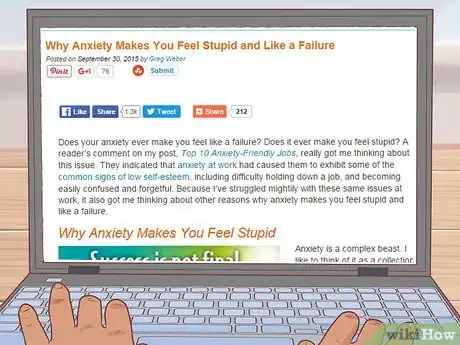
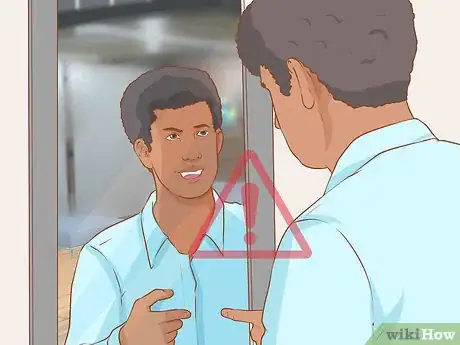
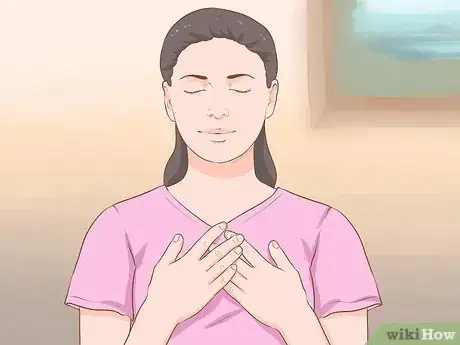
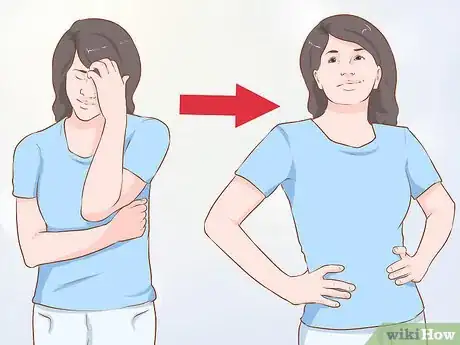
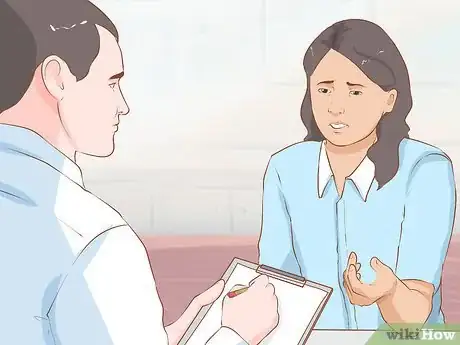
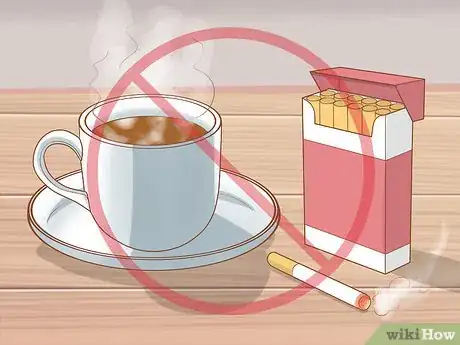

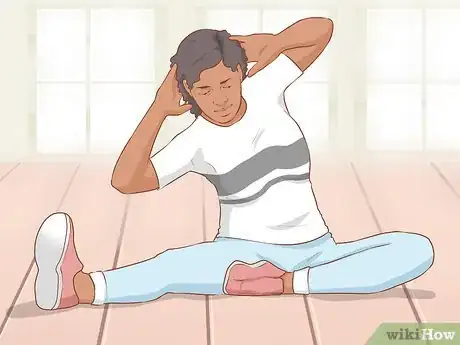

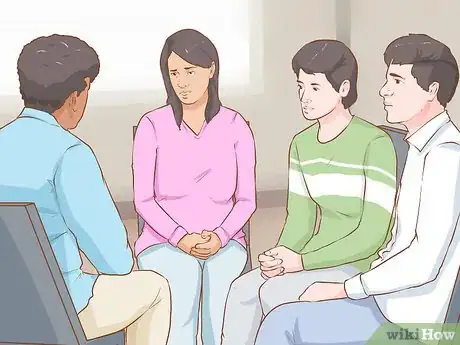

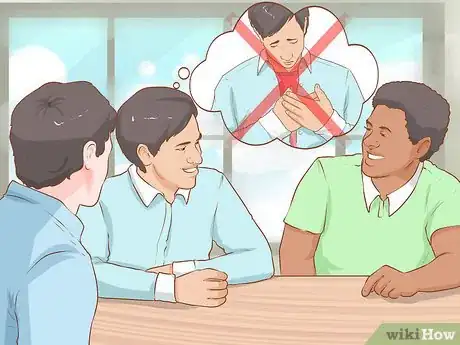

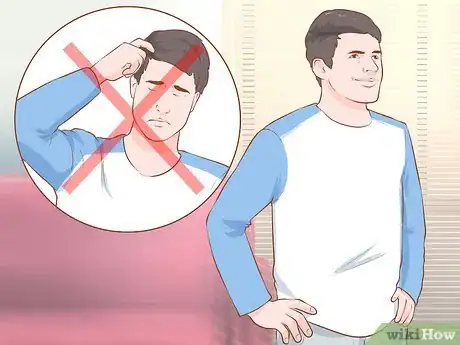






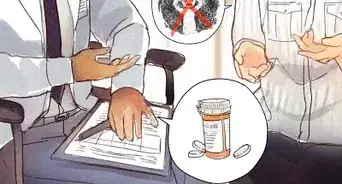
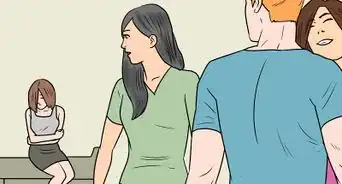
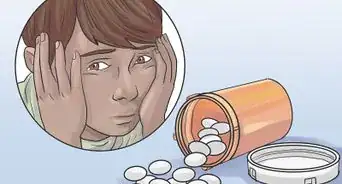



















































Medical Disclaimer
The content of this article is not intended to be a substitute for professional medical advice, examination, diagnosis, or treatment. You should always contact your doctor or other qualified healthcare professional before starting, changing, or stopping any kind of health treatment.
Read More...